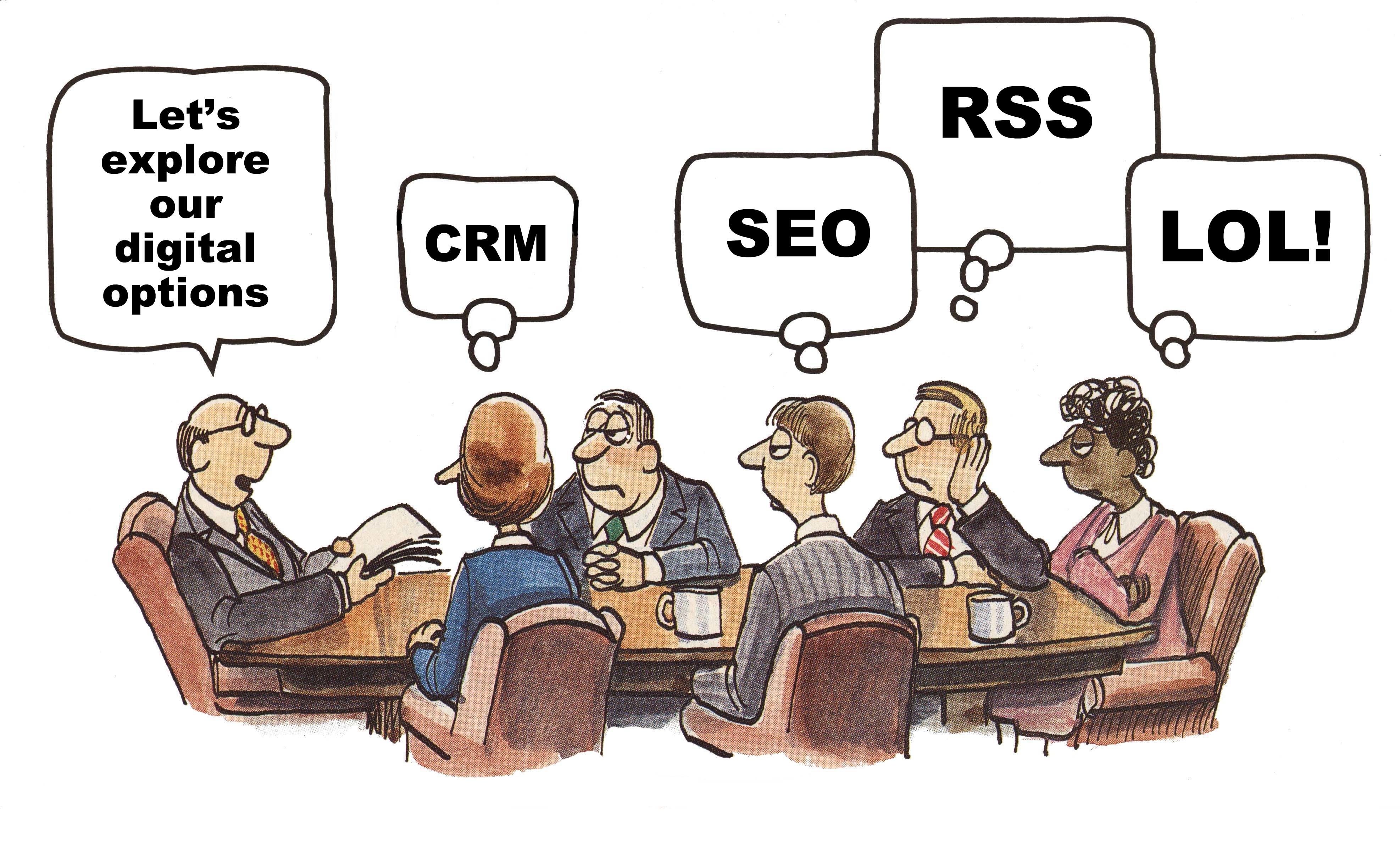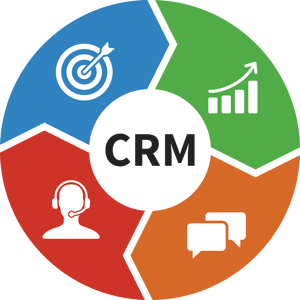
CRM SYSTEMS
A Resource for Small Businesses
“Customer relationship management” can sound intimidating to small- and mid-sized businesses. After all, if your company only has a handful of customers, why do you need a dedicated process or system to keep track of them? A few spreadsheets and rules of thumb will do just fine.
But what happens when business starts to boom? At some point, the organization will need to implement a customer contact management system that’s more organized and streamlined than a mass of spreadsheets. And such a migration could be painful if the decision has been put off a few too many months, or even years. With a CRM in place it will be easier for a company to scale.
 At its core, a CRM is not just useful to large enterprise companies -- it’s essential for businesses of all sizes.
At its core, a CRM is not just useful to large enterprise companies -- it’s essential for businesses of all sizes.
But don’t just take our word for it. Did you know that 75% of sales managers say that using a CRM helps to drive and increase sales? Or that CRM systems improve customer retention by 27%?
CRM stands for customer relationship management, and it refers to software that helps companies track interactions with their future and current customers. The goal of implementing a CRM is to create a system that your sales and marketing teams can use to more efficiently and effectively interact with prospects or customers. Marketing will often use a CRM to ensure that they’re passing the right leads to their sales team -- a key aspect of developing a strong relationship with the sales team. Salespeople utilize the CRM in a different way. They use it to source prospective customers, communicate with them, and track their interactions over time. Having the entire prospect history in one place increases their efficiency and improves their productivity. For instance, salespeople using a CRM won’t have to hunt through their email to remember where a conversation left off. A good CRM system allows sales and marketing to see where a customer is in the buying cycle and what is in the pipeline.
The short answer is that any company who seeks to maintain a relationship with their customers can benefit from using a CRM system. To get a little bit more specific, there are two groups of companies that often see the most benefit:
B2B companies that typically need to track leads and customers across long sales cycles and through upgrade paths (e.g., a software company, a recruiting firm)
Considered purchase B2C companies (e.g., a jeweler, a landscaping service, Investment advisor, insurance, technology companies, realtor, or other services companies.)
That being said, there are a lot of companies who don’t fit the above profiles, but still find value in using a CRM system. Another way to understand whether or not a CRM system can help your business is to think about the challenges that CRM systems aim to solve:
If you answered yes to any one or more of the above questions, chances are your business could benefit from a CRM system.
There are many things a CRM can do that should get marketers, salespeople, or business owners pretty excited! Here’s how a CRM can make you a more effective marketing and sales machine...
Wouldn’t it be helpful if you knew when a potential customer was looking at your website? Implementing a CRM will allow your sales team to know how many times potential customers have visited your site or if they have ever talked to a member of your sales team.
When a salesperson works within a CRM that integrates with their company’s marketing software, they’re able to access this type of detailed, real-time lead intelligence all from one place. And this isn’t just beneficial to sales; it’s beneficial to marketing as well. A CRM will allow your marketing team to see which leads turn into customers. More specifically, you can see what brought them to your website and what pages they looked at before becoming a customer.
When a marketer works in a marketing platform that is integrated with a CRM, they are able to figure out which of their efforts are working best.
Sales and marketing both have numbers they need to hit each month, and when both teams have visibility into one another metrics they can easily assess each team’s progress and identify and remedy problems early on in the month. Real-time reporting holds both teams accountable to their goals and helps one another work together toward shared outcomes. (It’s also worth noting that CRMs are used for customers, too, not just leads; so, customer service communications and metrics can be easily documented for account managers to reference as well.)
A CRM not only gives complete visibility into the sales pipeline, but it also helps sales people prioritize who to call first so they don’t miss important opportunities. When sales and marketing set up a CRM, they can identify important criteria and even implement a lead scoring system. Organizational systems like these reduce time spent sifting through leads and enable salespeople to prioritize the best opportunities.
When you integrate marketing software with your CRM, marketing can easily analyze the effectiveness of its campaigns using closed-loop reporting. For example, when a salesperson converts a lead into a paying customer, he or she can mark it in the CRM, and it will automatically be noted in your marketing software, too. This allows marketing to do two important things. First, marketing can automatically remove this lead for their nurturing sequences, and instead send it customer-focused information. Secondly, marketing is now able to attribute this new customer to a specific campaign and channel. Mapping marketing activities to sales events is critical for marketing to improve future campaigns.
So now that you have a pretty good idea what CRM's do and why you need them, let's discuss how to pick one. Beyond the obvious cost requirements this list touches on some of the most important features to look for when choosing a CRM for your small business.
 Contact Management
Contact Management
You won’t find a CRM that doesn’t have a contact management capability. If you do, chances are you aren’t looking at a CRM. All CRM systems allow salespeople to create contact records and store prospect and customer information in a database. However, the best systems that truly improve efficiency will reduce and streamline contact data entry as much as possible.
Judge this feature with ease of use in mind.
Conversations
You should look for a platform that allows you to interact with your contacts by their preferred method, whether that be social media, like Facebook, LinkedIn, or Twitter, email, or chat conversations on your website. Get a CRM that will keep all of this communication in one place for you and your team.
Deal Stages
Most CRM systems can be customized to operate on a specific sales process. Whether your company has three deal stages or 15, you should be able to program these levels into the software and attach associated values.
It should also be easy to move a deal along the sales process, from one stage to the next. In HubSpot CRM, advancing a deal is as simple as dragging and dropping:
Make sure the system you are using can be customized to your needs with ease.
Daily Dashboard
Sales people need visibility into a number of metrics on a daily basis. Metrics such as their progress to date against quota, how many deals they have in their pipelines at which stages, and what outstanding tasks they need to complete. Similarly, sales managers and leaders need to be able to view these categories for the aggregated sales team.
Evaluate this function based on visual appeal and simplicity.
Task Management
A sales person who has to toggle back and forth between several different systems to view and complete their daily tasks is not a happy person (though this is common). CRM systems that include task management capabilities streamline salespeople’s day-to-day workflow and help them keep on top of their follow up.
Content Repository
According to Docurated’s State of Sales Productivity 2015 study, salespeople spend 31% of their time hunting for or creating content. To cut back on wasted time searching for content, look for a CRM system with an embedded content repository. Look for a system that allows salespeople to save their go-to pieces of collateral in one place. And it’s not just collateral. Writing email copy can be another time suck for a busy sales person. Look for a system that also allows the user to file away customized email templates, so the sales rep is not reinventing the wheel with every new outreach.
Automated Data Capture
One of the primary reasons companies decide to adopt a CRM is to keep better track of customer and prospect touches (emails, calls, etc). But, beware: Many CRM applications require salespeople to copy and paste their email outreach into the system or even upload call recordings. These extra steps can be maddening for salespeople who are making 50 or 100 calls every single day, and it leaves room for human error. Look for a software that does this step automatically. HubSpot CRM automatically logs calls made and emails sent, and posts them in a timeline-like view on a contact’s record page:
Reporting
A CRM system is only as good as the insights it provides. Be sure that your CRM provides reporting features that make it easy to export and distribute the trends that the system reveals.
Mobile
Sales reps have seen productivity increased by 15% when they had mobile access to CRM applications. Tying reps to a CRM system that can only be accessed via laptop is bound to annoy them, especially if they’re in a role that requires travel. The majority of CRM systems today allow salespeople to log on to the application from mobile devices such as tablets and smartphones -- make sure the ones you’re considering do as well.
Integration with Marketing and Sales Automation
And last but not least, integration between your marketing and sales platform is crucial. After all, the underlying concept of “customer relationship management” is to provide a complete lifecycle view into each prospect and client. A gap between marketing automation and the CRM can lead to lost information and lost opportunities.
Conclusion
To reap the full benefits of a CRM, you have to choose one with the features that are right for your business today and that can grow with you as your business evolves. Think about your company’s growth goals and consider both your short-term and long-term needs when investing in a CRM platform. Keep in mind, a CRM is not only a financial investment, it is also a time investment for your sales and marketing organization. Picking the right system, implementing it, and enforcing best practices around it’s usage will pay dividends as your company continues to grow and scale.
As the owner/partner of Buckeye Wealth Management, an Independent Registered Investment Advisor, I was able to partner with Anne at Ballyhoo Marketing Advantage to supplement our marketing efforts and help grow our firm. Anne redesigned our website from scratch and turned it into a lead generating engine for our firm. She has also helped us ramp up content marketing and blogging as we continue to build credibility and our social media presence. She has helped us leverage our CRM and other technology vendors as well. Anne is a decisive, creative, and tech-savvy business partner who is a pleasure to work with.

Jeffrey G. Best, CFP® Buckeye Wealth Management
I contracted Anne's help as the CEO for a national agency that provides Specialty Lenders Insurance. As a leader at Golden Eagle Insurance, I was able to partner with Anne at Ballyhoo Marketing to supplement our marketing efforts by turning our website into a lead generating engine, develop and deploy targeted content marketing, build a social media presence and start blogging to build credibility in our industry. She was instrumental in helping us select and deploy software for marketing/sales automation and customer relationship management. Anne is an inspired, honest, and creative business partner. Ballyhoo Marketing Advantage was continually engaged in learning more about our company, our customers, and our sales funnel in an effort to help us grow and transform the company into the digital age.

Sue Miller Golden Eagle Insurance